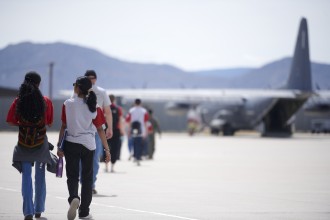Reaching For The Sky … And So Far Beyond
Reaching For The Sky … And So Far Beyond
June 22, 2023By EFRAIN VILLA

Picnicking, swimming and bike riding are wonderful summertime activities for young children, but piloting a multimillion-dollar airplane thousands of feet above the New Mexican landscape is one of the most age-appropriate activities to add to that list, according to retired Lt. Col. Alex Carothers. He emphasizes that teaching children to shoot for the stars is especially important in underserved communities.
Carothers’ passion for all things aviation and helping young people reach unimaginable heights, figuratively and literally, is immediately evident when he speaks about the Tuskegee Airmen, Inc., Albuquerque chapter, which he heads. Known as the Maj. Gen. Lloyd W. "Fig" Newton Chapter, the local group is part of the national organization that was founded to honor and preserve the legacy of the Tuskegee Airmen, a group of African American military pilots and personnel who served during World War II.
Despite facing discrimination and segregation in the military and in society at large, the Tuskegee Airmen distinguished themselves with their bravery and skill in combat. After the war, the Tuskegee Airmen continued to fight for civil rights and equality, and their legacy has had a lasting impact on the United States military and society as a whole. In 1948, President Harry Truman signed an executive order desegregating the armed forces, in part due to the advocacy efforts of the Tuskegee Airmen and other civil rights activists.
“I met the Tuskegee Airmen when I was a kid,” says Carothers. “They were part of the reason that I went to the Air Force Academy and went to pilot training. A career in aviation is not something that faces like ours wake up and start thinking about on their own.
“Through our local Tuskegee Airmen, Inc. chapter," he continues, "we expose kids to possibilities they didn’t know existed and we get them to do the impossible. We give them opportunities to see themselves with wings on their chests or as air traffic controllers, aircraft mechanics, astronauts and scientists. Our people just don't typically see that. They see sports all the time, and I'm the first to tell people I was a 96-mile-an-hour fastball dunking athlete, but an athlete who also flies airplanes. I can't imagine a life without having been to 127 countries and flown all over the world. I want kids to see that because many don't.”

Carothers believes that exposure to different professions and fields of study at an early age can broaden horizons in profound ways that break generational cycles of economic, social and psychological distress.
“When I was at the academy and learning psychology, we learned that we're all born into a box,” says Carothers. “Your box is as big as your parents’ box. If your parents’ box is small, so is yours. It takes somebody like us, and the Tuskegee Airmen’s legacy, to come and tear those small walls down and show them this really gigantic box that aviation can give them. The Tuskegee Airmen overcame two wars: prejudice and World War II. They won both of them. The people who volunteer with our programs feel we have to do this type of service for other generations, otherwise we dishonor that legacy.”
The Albuquerque chapter of the Tuskegee Airmen provides various opportunities for young people in the community to learn about aviation and STEM fields, meet with professionals in these industries, and gain hands-on experience with aviation equipment and technology. These activities are carried out through no-cost educational programs and workshops, including aviation camps, career fairs and mentoring programs. The organization also helps connect youth to scholarships and grants for students pursuing degrees in aviation and STEM fields, while at the same time upholding the legacy of the Tuskegee Airmen.
The connection to overcoming social inequality is at the heart of the organization’s mission. Historically, women and people of color have been underrepresented in aviation and STEM fields, and promoting these disciplines to young people from diverse backgrounds can help to break down historical social barriers and create greater opportunities for all. While the Tuskegee Airmen organization was founded to honor and preserve the legacy of African American military personnel, the organization's mission is also to inspire and motivate all young people to pursue careers in aviation and STEM fields, regardless of their background or ethnicity.
While there certainly are many professions outside of aviation that can offer good pay, fulfillment and job security, the Albuquerque chapter of the Tuskegee Airmen, Inc. focuses on aviation and STEM fields because, in addition to providing a wide range of exciting and rewarding career opportunities from piloting planes and designing aircraft to developing new technologies and exploring space, these fields also are constantly evolving and advancing, offering endless possibilities for innovation and discovery. And aviation and STEM fields are crucial to the continued growth and success of the global economy and sustainability efforts. These industries drive innovation, create jobs and help to solve some of the world's most pressing challenges, from climate change to healthcare.
Social and economic benefits aside, it is extremely cool to get to pilot a real airplane a full decade before being eligible to vote. Although it might be terrifying for a parent to imagine their young child zipping above the earth, Carothers is quick to point out the impeccable safety record of the chapter’s activities.

“I do a lot of prepping of the parents through the parent form and orientations,” says Carothers. “That gives parents the opportunity to meet me and my staff and ask questions, and I introduce them to my 17-year-old son who has participated in the programs and is now one of the youngest private pilots. I've used my sons, both of them, to show this can be done safely and that I myself trust these camps with my own children. All of us running the camps have some affiliations in the military, so we're really regimented about things. The same with camps and the dorms and things like that. If a kid opens the door to the apartment at two in the morning, there's one of my staff members on the other side of that door.”
For parents or children who might feel intimidated by the prospect of operating aviation equipment or being in a new setting, Carothers believes fear should not be a deterrent. “Young people tell me all the time, ‘I’m afraid of heights.’ I get to tell them that this 7,500-hour military fighter is also afraid of heights, and so what? Do not let your fears of the unknown stop you from experiencing a life you can’t imagine right now.”
Planning for the camps and carrying out the other functions of the chapter are year-round activities. Due to funding shortfalls, this summer the chapter will not host its space camp, but it has secured enough funding to host a five-day aviation camp that exposes young people ages 12 to 18 to everything aviation at Kirtland Air Force Base and in the local area. The chapter hopes to expand the program to pre-pandemic levels in future years.
Those of us who have aged out of the services the chapter provides can still participate by becoming volunteers, members or donors. Programming is always provided free of charge through the support of donors, grant-makers and volunteers. Currently, the chapter has many volunteer opportunities and membership vacancies to fill.
For more information visit tai-albuquerque.org.





